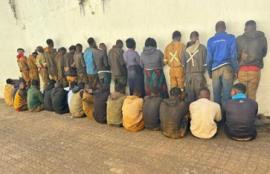
BY STYLE REPORTER
FOURTEEN-YEAR-OLD Anesu Mugiya has big dreams. Despite losing both parents and being taken care of by an aunt, she is determined to realise her dream.
Anesu, from Mukwatsa village, is among many girls in Rushinga district in Mashonaland Central province undergoing a unique programme designed to empower adolescent girls.
The DREAMS (Determined, Resilient, Empowered, Aids-free, Mentored and Safe) programme has touched the lives of hundreds of girls in Mashonaland Central and many other parts of the country through mentorship and school fees payment.
The National Aids Council (NAC) is facilitating the project, which offers a safe place where vulnerable adolescent girls can speak with mentors and each other about their problems.
Girls learn about sexual and reproductive health and rights, financial literacy, and how to navigate difficult social situations, including coercive relationships. The programme also aims to give girls the confidence and self-esteem to stand up for themselves.
“I lost both my parents and initially we went to stay with our mother’s family after the death of our father, but our mother died a few months later. We were forced to come back to Rushinga to stay with my uncle [my father’s brother],” Anesu said.
“My uncle is not employed and has his own children. We are three in our family, so our uncle is looking after seven family members, including his children and wife.”
- Chamisa under fire over US$120K donation
- Mavhunga puts DeMbare into Chibuku quarterfinals
- Pension funds bet on Cabora Bassa oilfields
- Councils defy govt fire tender directive
Keep Reading
Anesu said she had to spend a year at home until she was approached and roped into the DREAMS programme.
“My dreams were shattered because I was looking forward to do a decent job after school and marry late. I thought I would never go to school again, but I thank God because I have been given another chance to proceed with my studies,” she said.
“The DREAMS programme is doing wonders and it’s making an enormous impact on my life.
“We are learning a lot of things, including that early marriages are wrong. They are wrong in the sense that they breed gender-based violence, something that I have seen happening in our community, especially for those, who married under the age of 16.”
She said apart from early marriages, they were also doing sessions on sexual and reproductive health as well as HIV and Aids.
Her mentor Theresa Kuwa said the programme is helping girls to socialise with their peers and learn from others about how to defend their sexual reproductive and health rights.
“Girls learn a lot of things under the DREAMS programme, with the main emphasis being helping them navigate difficult social situations. A lot of girls who have gone through this programme are doing well and the mind-set of the community has changed,” Kuwa said.
Rushinga, one of the most marginalised communities in the country, is characterised by rampant child marriages, which, according to NAC, is fuelling HIV and sexually-transmitted infections.
In light of this, NAC is implementing the DREAMS programme and paying school fees for vulnerable girls in Mashonaland Central through the National Aids Trust Fund.
The programme, which started in 2019, is targeting vulnerable adolescent girls and young women aged between 10 and 24.
The programme is targeting 10 wards in each of the Mashonaland Central province’s eight districts.
Provincial Aids coordinator for Mashonaland Central Edgar Muzulu believes the DREAMS and another programme targeted at girls and young women – Sista2Sista – are changing the mind-set of the community with regard to child marriages.
He said the main aim is to reduce new HIV infections, especially among young people considering that HIV disproportionately affects women and adolescent girls because of vulnerabilities created by unequal cultural, social and economic status.
According to the United Nations Programme on HIV and Aids, young women (10-24 years old) are twice as likely to get HIV as young men the same age.
“You know Mashonaland Central province is one of the communities in the country where child marriage prevalence is high,” Muzulu said.
“As NAC, we coordinate all Aids activities in the country, but when we notice gaps, we move in to fill them. That is the case with the DREAM project. It is being funded by NAC across the country and here in Mashonaland Central we are implementing it in all the eight districts.
“We are also doing Sista2Sista programmes, which are being implemented by our partners. These models seek to reduce new HIV infections and educate girls and young women.”
Village head for Mukwatsi village Davis Makiwa said as traditional leaders they have embraced sexual and reproductive health rights in their programmes as well.
“We are working with NAC and several other partners to curb child marriages, reduce HIV and end gender-based violence. As traditional leaders, we believe it is our duty to lead by example,” Makiwa said.
“We have realised that this programme and many others being implemented by NAC and its partners have been effective as we are now seeing child marriage and gender-based violence cases going down.
“We have also seen a number of community members, including those belonging to faith-based groups, embracing the programme as evidenced by the increasing number of girls from the villages and churches who are now part of these programmes.”
NAC district coordinator for Rushinga Eric Taramusi said programmes such as DREAMS and Sista2Sita were going a long way in the response to HIV and Aids.
“It is pleasing to note that Rushinga, as a district with a high prevalence rate of child marriage, has embraced such programmes,” Taramusi said.
“Our programmes include sensitising communities and engaging community leaders discussing issues like child marriage as well as HIV and Aids.”










